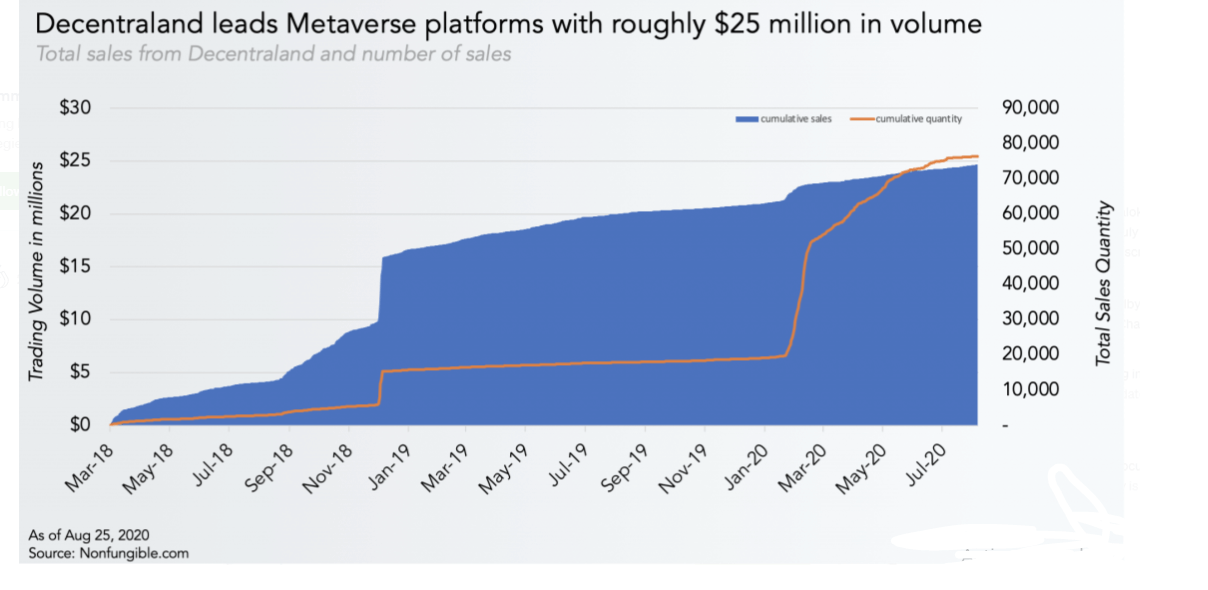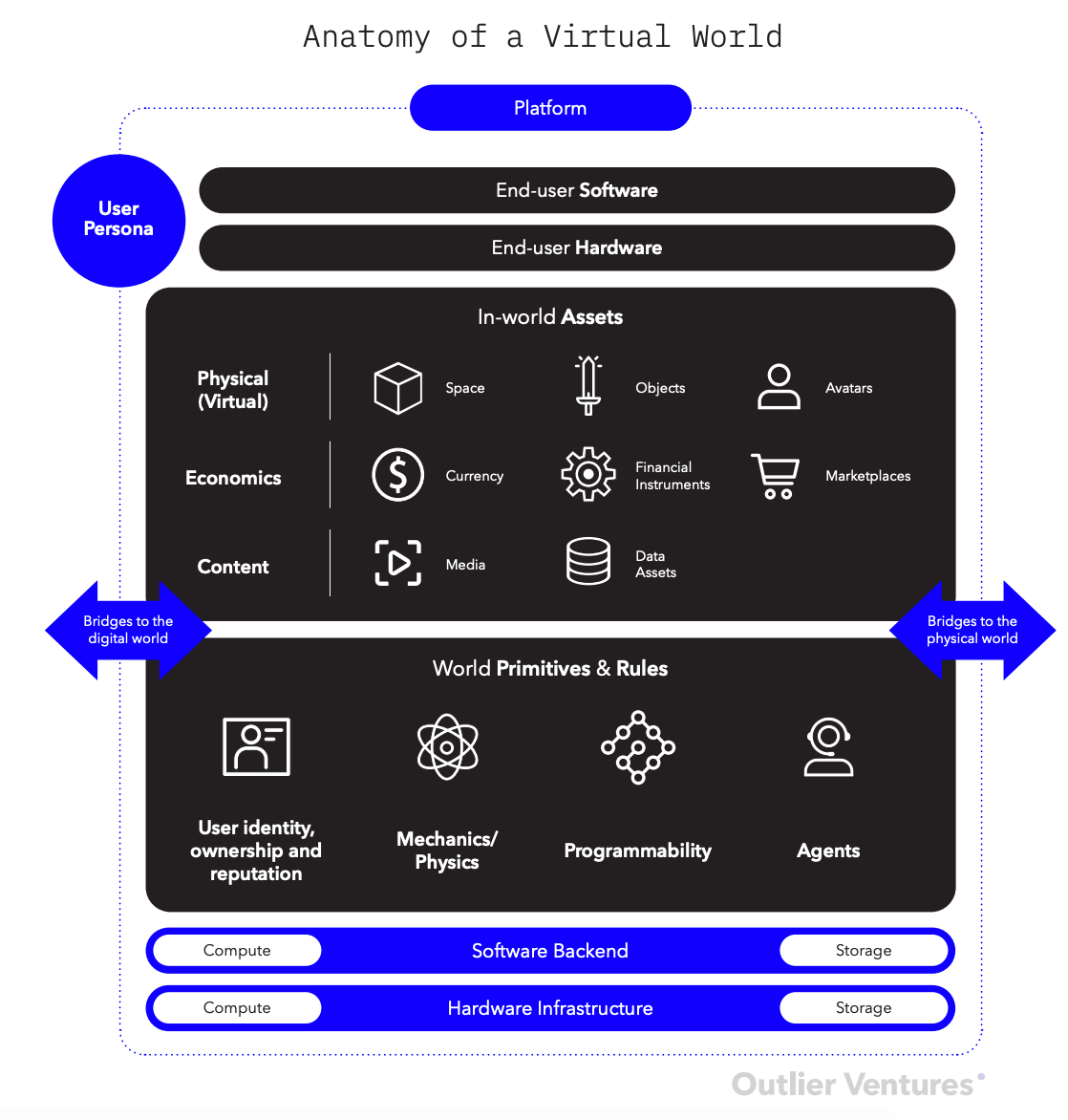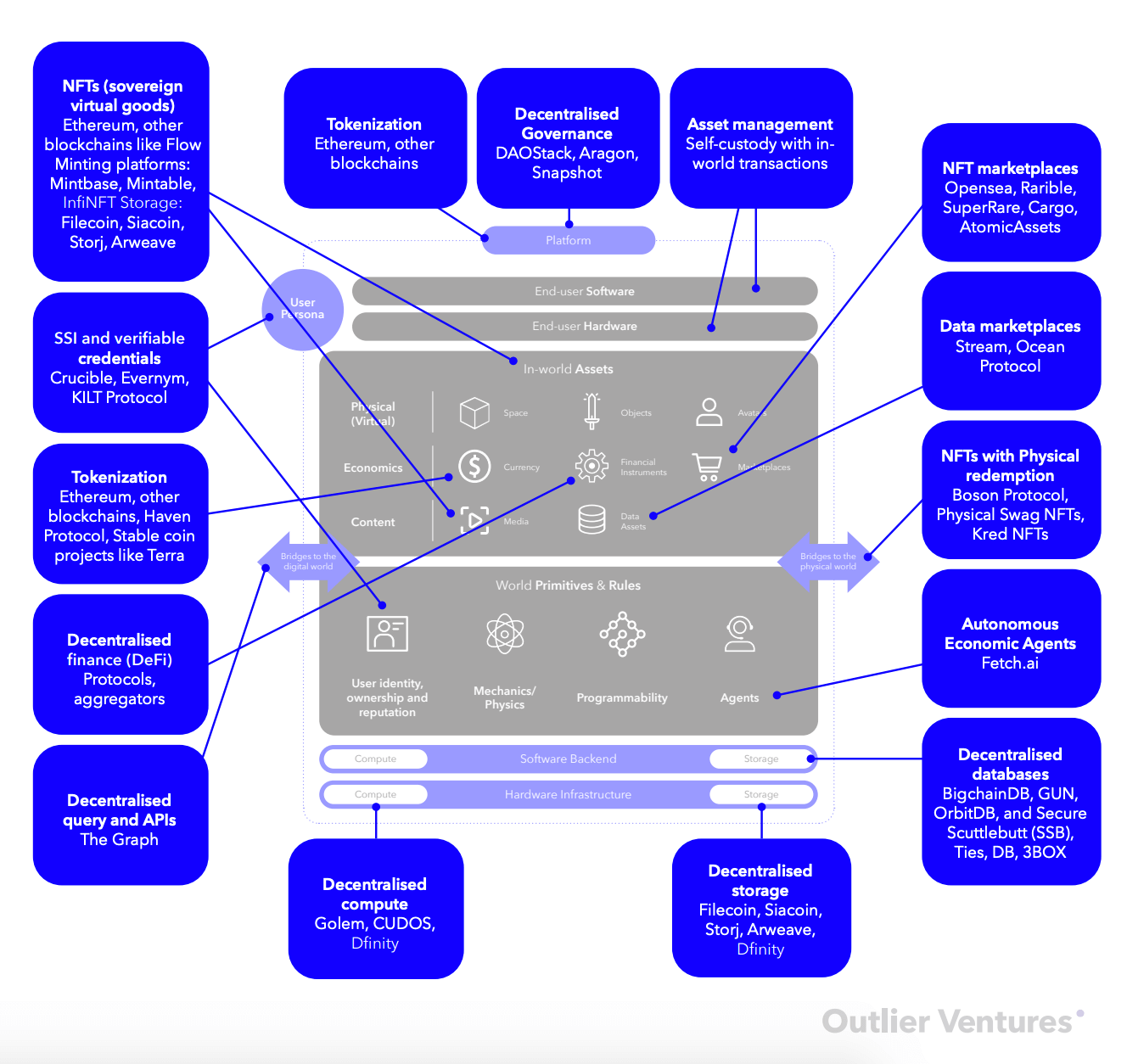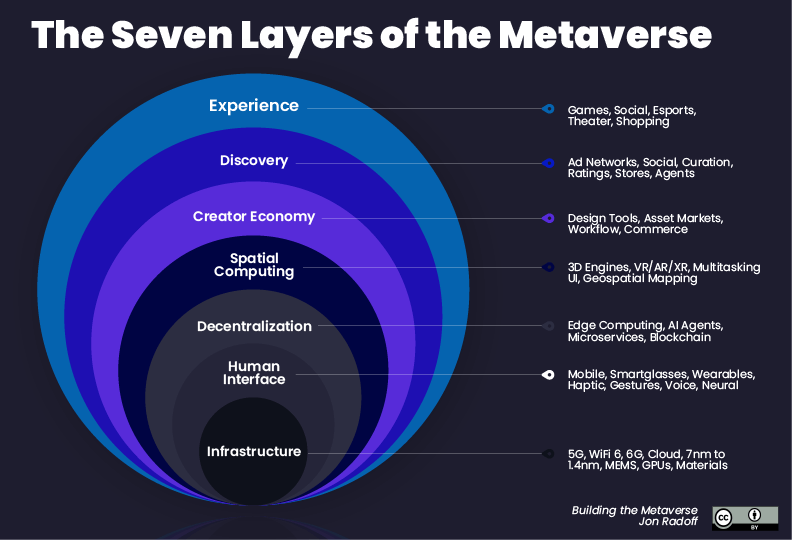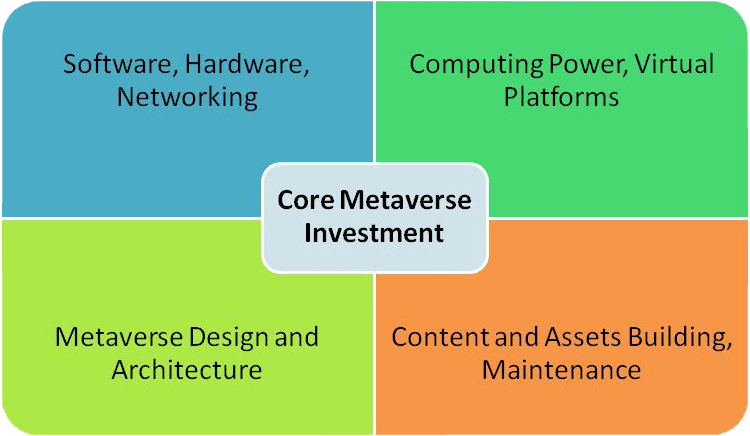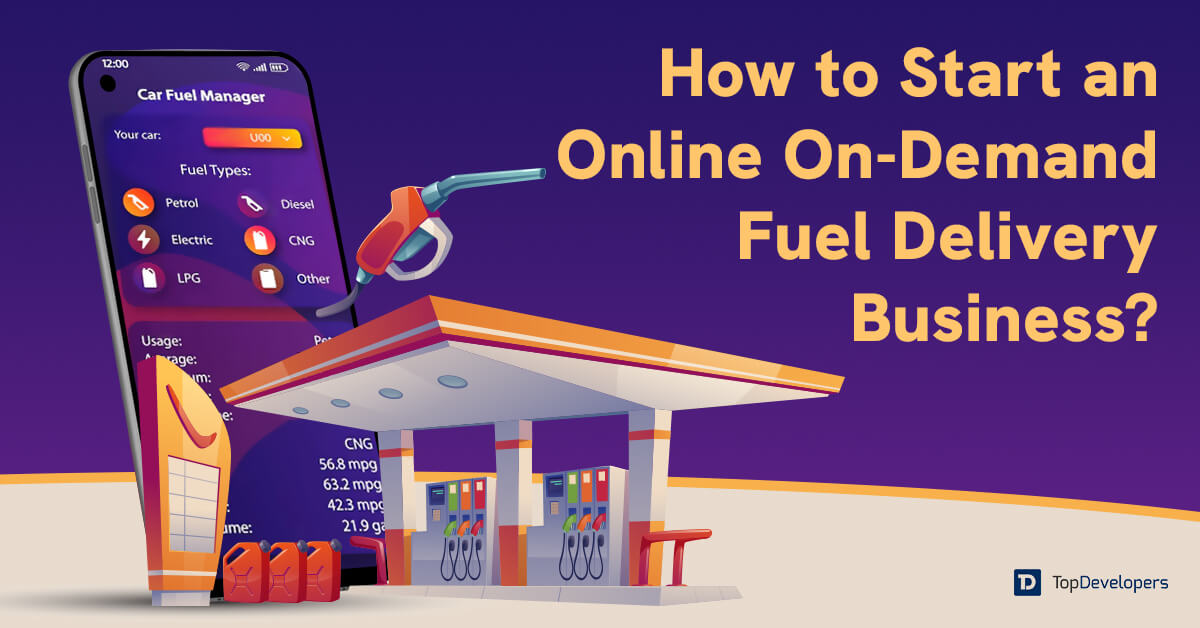
The extraordinary experience contemporary technologies offer today has been unprecedented. The latest icing on the cake is Metaverse –a marvelous fusion of Virtual Reality (VR), Augmented Reality (AR), and Extended Reality (XR). The metaverse is the next and probably a bombastic form of the Internet that can superimpose virtual objects into the real world. If split, its ‘meta’ means beyond and ‘verse’ as in the universe.

So, the metaverse is what?
A digital utopia that humans can actually live and experience!
Table of Contents
- Metaverse – The purpose
- Metaverse – The possibilities
- Metaverse – Much beyond Facebook
- Metaverse will show its omnipresence
- Metaverse standards
- Metaverse and startups
- Metaverse – where cash will flow
- How will the Metaverse benefit B2B companies?
- How to take advantage of the Metaverse?
- How Can You Step into Metaverse World?
- What does the market hold for eCommerce in the Metaverse landscape?
- How Retailers Can Benefit From the Metaverse
- Crypto and blockchain in the metaverse
- Early Adopters Brands
- The time is now
Metaverse – The purpose
The metaverse depicts a common digital world wherein users gather, engage, and share their ebullient experiences without being physically present. In fact, the digital setup is to transform the user’s physical self into virtually omnipotent with more power and flexibility. The metaverse would focus more on building a persistent image of a user’s character rather than their evanescent being.
Metaverse – The possibilities
Quite limitless! Top-notch companies such as Facebook, Epic Games, Roblox, and Decentraland have already unleashed the metaverse giant to push their products and services toward unparalleled user experience. Whether Paris Hilton in Decentraland’s Metaverse Concert or other performers in Lil Nas X concert on Roblox, millions of people witnessed the true marvel of the latest technology. The note “The metaverse is the next big investment theme” from Morgan Stanley is not exaggerated.
Thus far, big players have built their customized versions of the metaverse, but the ‘real’ one would be built only when organizations and companies are globally connected and synchronized. The cross-company ties to provide seamless experiences to their collective users through digital empowerment would come soon enough.
Metaverse – Much beyond Facebook
A giant leap by Facebook toward Horizon, the social reality networking application, proves that tech companies are serious. The digital beings (or let’s call them avatars) from around the world can virtually work, play, and share their experiences with each other. Microsoft, too, is into building an enterprise metaverse to add its chapter to the latest trends.
It is not alien to the present-day business that engaging customers and providing them with a unique experience are the two ultimate keys that can open any lock of opportunity. In Cathy Hackl’s own words from Forbes,
Just like many in the early 2000s thought they would never need a social media presence (many leaving it in the hands of their summer interns to manage and set up the corporate social media accounts), brands in the 2020s will need to start setting up metaverse teams that will help them enter the era of Web 3.0.
Metaverse will show its omnipresence
Simply defined as a shared, persistent, three-dimensional virtual environment, the metaverse would enable users not just to look at embodied Internet but also live in that. The technology would involve multiple devices and gadgets ranging from handheld mobile phones to TV, VR headsets, and AR smart glasses.
The social media giant Facebook (Meta) calls itself a metaverse company and has already tried Horizon Workrooms virtual offices. It showed employees in cartoon avatars taking their seats around a virtual conference table and communicating on a common shared writing board.
Likewise, Microsoft, too, showed its virtual collaboration technology Mesh and HoloLens. The Mesh is a step further to Augmented Reality, which they call ‘Mixed Reality (MR)’. Supported by Azure cloud, the technology allowed users from various locations to gather and share holographic experiences all across devices.
Metaverse standards
Deploying newer software and hardware devices could obfuscate the metaverse technology to adapt; in fact, it is the biggest challenge for startup enterprises. The future industry would need to craft separate technology protocols and communication standards. On the other hand, Nvidia and Unity Software have set their minds to sell tools built on future metaverse technology. Also, it is more than just a network of smart devices –
“To enable widespread adoption and help accelerate the development and evolution of an interoperable peer connectivity and communications framework based on AllJoyn for devices and applications in the Internet of Everything.” — Allseen Alliance
Setting standards for the metaverse could be a pretty big sum. Have a look at what DNLA defines –
The Digital Living Network Alliance (DLNA) was founded in 2003 by a collection of global companies with a vision to easily connect and enjoy photos, music and video among networked consumer electronics, PC and mobile devices.
The collaboration between industries and companies for setting and accepting standard-based interoperability is the pillar of adapting the metaverse. Companies like Facebook, Nvidia, Unity, Amazon, Apple, Microsoft, etc., would initially absorb the toolsets that define designs, development, and operations for their own metaverse.
The issue would arise when such players would compete to set open standards but would be reluctant to claim the proprietary rights because of the possible loopholes in the primitive nature of the technology. The APIs would form the pillar of interoperability; nevertheless, it won’t be like hitting a sitting duck because various platforms would compete with each other in the same fragments.
A detailed graphical presentation of the virtual (metaverse) open OS model is beautifully carried out by Outlier Ventures.
The ray of hope comes with economic trends in the digital market. For instance, Disney’s Pixar made its file format, Universal Scene Description (USD), open source. The result – it helped developers build interchangeable three-dimensional data. Likewise, Nvidia built an Omniverse platform that used USD to successfully pull in assets from AutoCAD, Unreal, and Maya to form a standard sharable virtual environment. In short, there cannot be one encompassing metaverse which can control everything.
Metaverse and startups
The metaverse is to offer many opportunities to enterprises in quite near future. The all-encompassing, closely knitted Internet society of the metaverse has recently shot to be a priority for most companies during the pandemic. The seven layers of the metaverse have a lot to offer. The creation and distribution of content have changed for personal and professional works in recent times, forcing everyone to opt for metaverse, the untraditional super digital environment.
The technology offers a gamut of opportunities for young entrepreneurs to invest in metaverse startups. Here are a few –
Remote work platforms
The meeting application Zoom shot to its fame in the pandemic. The lockdown taught multinational companies that their workforce is more productive from their homes; even further, they observed marked savings in their overheads. Clear as a crystal, businesses investing in building remote work platforms based on the metaverse make relatively better business sense. Metaverse would offer more dynamic and virtual reality space for collaboration and teamwork.
Digital products
Different avatars have been quite a rage for the past few years. In fact, most games monetize clothing and other accessories of characters and their vehicles as users want their characters to look different and dashing. Literally, anything can be made digital, and this could be good for enterprise businesses in the metaverse.
Games
Games are probably the genre that fueled research and advancement in metaverse technology. Axie Infinite reported a whopping $190+ million in revenue in just over a month; the AXS token shot to USD 162 after Facebook rebranding. Lastly, Facebook’s latest metaverse announcement has pushed an accelerator on ample blockchain games on their success path. Startup metaverse enterprises may look to build hyper-gaming experience with multi-dimensional effects.
Sponsorship
Hosted in the metaverse, giant events and concerts make great headlines all over the world. Sponsoring such events and concerts could be one of the best bets for startup businesses. Recent examples of such business include Travis Scott’s event by Fortnite and Minecraft’s popular music event by Massive Attack. These events successfully made headlines and attracted everybody’s eyeballs surfacing all hints that the future belongs to events and concerts held in the metaverse.
Metaverse – where cash will flow
While startups can find various sectors of Metaverse to invest in, the primary cash will flow into the areas to build the Metaverse. It is because the technology is still in its infancy but is growing at a tremendous rate. Billions of dollars are put by global tech giants in building metaverse.
According to Jed Strong, CEO of gaming payments company Tiv, the growth of the metaverse is going to be relatively gradual. The wholesome of the metaverse will be felt only when interoperability powers the real-time three-dimensional worlds on a massive scale. Nevertheless, it is pretty evident that any new technology would require significant funds to build the core infrastructure abiding by internationally set standards and regulations.
How will the Metaverse benefit B2B companies?
The metaverse presents several potential benefits for B2B (Business-to-Business) companies. While the metaverse is often associated with consumer experiences, it can also offer significant advantages for B2B organizations. Here are some ways in which B2B companies can benefit from the metaverse:
Improved Collaboration and Communication
B2B companies can use the metaverse to enhance Collaboration internally and with partners and clients. Virtual meetings and workspaces within the metaverse can facilitate real-time collaboration, reducing the need for physical travel. Networking opportunities in virtual conferences and trade shows can help B2B companies connect globally with potential clients, partners, and industry peers.
Transmogrifying Customer Experiences
B2B service providing companies can create immersive experiences for their clients within the metaverse. Virtual product demonstrations, training sessions, and simulations can give customers a deeper understanding of products and services. Virtual showrooms or 3D product presentations allow customers to explore and interact with products more engagingly.
New Marketing and Advertising Opportunities
The metaverse is leveraged at scale for innovative marketing and advertising campaigns. Virtual events, exhibitions, and branded virtual spaces can showcase products and services to a broader audience. Interactive and immersive ad experiences within the metaverse can capture the attention of potential clients and create memorable brand interactions.
Increased Sales and ROI
The metaverse can enhance the sales process for B2B companies with virtual sales presentations, demonstrations, and negotiations, which can be conducted efficiently and cost-effectively. Companies can track user engagement and gather valuable data from metaverse interactions, leading to better-informed sales strategies and higher ROI.
How to take advantage of the Metaverse?
Taking advantage of the metaverse, a virtual, interconnected digital universe, can open up numerous opportunities for individuals and businesses. Here are some strategies to leverage the metaverse effectively:
Digitized products
Consider creating or digitizing products and assets that can be used or sold within the metaverse. This could include digital art, virtual real estate, virtual fashion, or virtual goods for virtual worlds and games. You can explore blockchain-based solutions for digital ownership and scarcity, allowing users to buy, sell, and trade unique digital assets.
Virtual business locations
Establish a presence in the metaverse by creating virtual business locations or storefronts. This can be a digital representation of your physical business or a purely virtual operation where customers can view and try products before buying them. You can offer virtual experiences, services, or products within these spaces to engage with potential customers.
Subscription-based revenue streams
Consider offering subscription-based services or content within the metaverse where customers will pay for the content consumed. It provides a consistent revenue stream and ongoing engagement with users. Subscription models could include access to exclusive virtual events, virtual classes, or premium virtual experiences.
Advertising
Advertising in the metaverse can be an effective way to reach a highly engaged audience. Explore advertising opportunities within the metaverse in virtual spaces, games, or social platforms. When you create immersive and interactive ad experiences that align with the metaverse environment, the users’ engagement level will surge.
Meta-education
The metaverse presents opportunities for education and training. Consider offering meta-education services like virtual classrooms, workshops, or skill-building programs. Also, you can create and sell educational content, tools, and experiences within the metaverse to cater to users’ learning needs.
How Can You Step into Metaverse World?
Exploring the metaverse and its potential for your business involves a strategic approach. Here are steps to help you for metaverse:
Research Your Target Audience
Understand your target audience and their preferences. Consider whether your audience will likely engage with the metaverse and what experiences they find appealing. After that, identify how the metaverse can address your audience’s needs or provide unique value. The research would help in finding how businesses should move into metaverse orbit.
Keep tabs on Competition
The most effective method to find out where you stand in the market with your current strategy is- to research what your competitors are doing in the metaverse. Analyze their strategies, virtual presence, and user engagement, which is a little daunting but essential in identifying the misses. Look for opportunities to differentiate your brand and offerings within the metaverse.
Strike a Balance
Like everything, the metaverse has its advantages and downsides, as it still lacks standards. Determine how the metaverse aligns with your overall business goals and strategy. Consider the resources and budget you can allocate to metaverse initiatives. Find a balance between experimenting with new metaverse experiences and ensuring they align with your core business objectives.
Add wings to your Creativity
Metaverse allows creative thinkers to play with technology and launch a brand or brand product with a unique story. Explore creative ideas for how your brand can enter the metaverse. Think beyond traditional approaches and consider how you can create immersive and engaging experiences. Brainstorm innovative ways to showcase your products or services in virtual environments.
Start Small and Scale
Begin with small-scale metaverse initiatives to test the waters and gather user feedback. It helps you refine your strategy and approach. As you gain experience and confidence, keep expanding efforts and resources in metaverse experimentation to move ahead securely.
What does the market hold for eCommerce in the Metaverse landscape?
The potential for eCommerce in the metaverse is gaining traction, and online retailers are taking the technology seriously to step up the conversion game. The accelerated leverage by eCommerce players indicates that soon, technology will form the basis of buying and selling products/services. The users warmly accept the metaverse-powered eCommerce. That’s why user penetration is expected to increase from 2.9% in 2023 to 8.6% by 2030.
The growing market size of the metaverse, with an annual growth rate of 36.62% during 2023-2030, results in a projected market volume of $201.8 billion by 2030. It makes perfect sense for eCommerce businesses to harness the vast potential and the opportunities that the metaverse presents. In this case, Metaverse development companies will help innovate the store and add features that engage the users.
How Retailers Can Benefit From the Metaverse
In addition to B2B companies, retailers also derive a range of benefits by embracing the metaverse. Here are the advantages that retailers will reap through opportunities created by the start-up metaverse.
Establish a New Revenue Stream
Retailers can create a presence within the metaverse and offer virtual storefronts or digital showrooms where customers can explore and purchase products. Virtual commerce within the metaverse allows retailers to tap into a new and potentially vast customer base interested in AR technology for guidance and interaction with 3D content. It allows users to make better purchase decisions and increase the conversion rate. It creates an additional revenue stream beyond traditional brick-and-mortar and e-commerce channels.
Lower Return Rates
Product returns badly impact the business profits, but it’s too familiar in the online space. Virtual shopping experiences within the metaverse eliminate this problem by providing customers with an immersive and accurate representation of products before purchase. By enabling customers to virtually try on clothing, test out furniture placement, or interact with products in a virtual space, retailers can reduce the likelihood of returns due to misaligned expectations. It leads to lower return rates and associated costs.
Conduct Free Market Research
Retailers spend haphazardly on conducting market research to identify real-life users’ preferences. The metaverse offers a unique opportunity for retailers to conduct market research in a virtual environment to check out the products before making them available for real users. Retailers can observe how users interact with products, gather insights into customer preferences and behaviors, and test new product concepts or store layouts without spending on physical prototypes or surveys.
Enhanced Brand Engagement
Retailers can create immersive branded experiences within the metaverse, allowing customers to interact with the brand more deeply. Virtual events, branded virtual spaces, and interactive storytelling can strengthen brand loyalty and engagement. Fortnite, the popular online game by Epic Games, hosted virtual concerts and events featuring artists like Travis Scott and Marshmello. These events attracted millions of players and spectators within the game.
Innovative Product Launches
The metaverse provides a dynamic platform for retailers to launch new products with virtual fanfare and interactive showcases. Retailers can create buzz around product launches through virtual events and experiences. The Uffizi Galleries in Florence, Italy, started exploring NFTs and the metaverse to digitize and showcase their art collection to a global audience.
Crypto and blockchain in the metaverse
Lately, crypto and blockchain technology have successfully bagged billions of dollars from investors. The technologies can further enable all payment gateways within the setup of the metaverse. Blockchain technology is also expected to assist users in building a consistent identity across the metaverse atmosphere. For instance, while traveling from the Roblox universe to the Fortnite game, the user can maintain a consistent identity.
Brian Biggott, co-founder of social metaverse startup Octi says that there could be innovative ways to conduct commercial activities using the metaverse. The social experience could be made unique by using AR technology for buying and selling goods.
The present bot algorithms track users to know their choices based on their browsing history; instead, the metaverse can open an all-new way to know everything about the user and how they build their virtual world. Blockchain technology would help improve persistency to provide real-time network building by maintaining a high-bandwidth and low-latency user experience. Though the metaverse is in its crawling phase, the global-scale VR customized environment will likely grab innumerable users worldwide.
Early Adopters Brands
The Metaverse landscape continually evolves, and the list of early metaverse startups has expanded. Here are a few notable brands and companies actively involved in the metaverse.
Nike: Nike entered the metaverse with its virtual sneakers and apparel, which users could purchase and wear within certain virtual worlds and games.
The Sandbox: The Sandbox is a user-generated content platform that allows users to create, own, and monetize their gaming experiences. Brands like Atari, The Smurfs, and Square Enix have partnered with The Sandbox.
Metahero: Metahero is a company that offers 3D scanning and modeling services for creating realistic avatars in the metaverse. This technology has applications in fashion, entertainment, and virtual events.
Microsoft: Microsoft’s AltspaceVR is a social virtual reality platform where users can meet and interact. It’s used for virtual events, conferences, and social gatherings.
Meta (formerly Facebook): Meta has been actively exploring the metaverse and virtual reality through its Oculus platform. It’s investing in creating a metaverse ecosystem, including the Horizon Worlds and Horizon Workrooms platforms.
Gucci: Gucci has ventured into the metaverse by creating virtual fashion items and collaborating with gaming platforms like Roblox to offer digital fashion collections.
Audi: Audi used virtual reality experiences to showcase its vehicles and features at auto shows and events, allowing users to explore the cars in a virtual environment.
The time is now
Established companies have already adopted the metaverse for their own branding. Crunchbase database has 150 enterprises with the metaverse in their company description. These companies rose just under USD100 million through various funding sources. Companies such as GuildFi, Uplad, and Inworld AI have already invested in virtual characters, NFT metaverse, and gaming platforms. Depending on the funds you have or arrange (bootstrap or crowd), you can venture into the Metaverse.
 Avantika Shergil
| Sep 28, 2023
Avantika Shergil
| Sep 28, 2023
Avantika Shergil is a technology enthusiast and thought leader with deep expertise in software development and web technologies. With over 8 years of experience analyzing and evaluating cutting-edge digital solutions, Avantika has a knack for demystifying complex tech trends. Her insights into modern programming frameworks, system architecture, and web innovation have empowered businesses to make informed decisions in the ever-evolving tech landscape. Avantika is passionate about bridging the gap between technology and business strategy, helping businesses build customized software and website, and understand about different tools to leverage effectively for their ventures. Explore her work for a unique perspective on the future of digital innovation.
